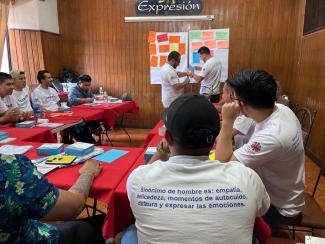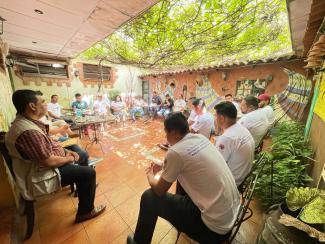Redefining Masculinity: Salvadoran Barbers Lead the Change Against Violence
El Salvador has long grappled with deeply ingrained attitudes towards masculinity that inhibit progress toward gender equity. The term machismo, which refers to a social construct of masculinity characterized by rigid gender roles and the belief in male superiority, is commonly used to describe these attitudes, and the practice has historically influenced societal norms that promote gender-based violence. To address machismo in a new way, USAID’s Office of Transition Initiatives (OTI) partnered with Cáritas, a faith-based organization dedicated to strengthening social cohesion in El Salvador, to connect with the leaders of an influential sector in men’s lives — barbers.
Barbershops, commonly perceived as bastions of machismo, provide a unique opportunity to engage with men and challenge their preconceived notions of masculinity. OTI supported Cáritas to hold a series of workshops, called “New Masculinities,” in the city of Santa Ana to socialize new, positive concepts of masculinity with the barbers and increase their understanding of how their actions could result in harmful psychological impacts on themselves and the women in their lives.

The program established a rapport with the barbers and facilitated discussions on the origins and impact of machismo attitudes. “Working with barbers posed a series of challenges, because they’re isolated from social interventions,” said a member of the Cáritas’ team, referring to how barbers are not often engaged as an audience for this type of initiative. However, by effectively building trust, the workshops were able to delve into personal experiences and encouraged the barbers to reflect on their own behaviors and beliefs.
For the barbers, the workshops provided a critical awakening. Samuel, who has been a barber for 26 years, confessed that he had little understanding of the concept of positive masculinity. "I learned that we were raised in a machismo culture," he said, reflecting on traditional expectations placed on men. “We were always told, ‘You’re the man in charge of the house. Don’t do [chores], only women do that.’”
The workshops, also designed to promote self-care and emotional well-being for men, enabled participants to recognize and confront their own emotions, often considered taboo for men. Embracing vulnerability was not an easy process, as many of the men found it uncomfortable and unfamiliar. However, the transformative power of the workshops became evident as participants like Enrique discovered the freedom to express their feelings. Enrique explained, “This training has been like opening up our minds and understanding that there is nothing wrong with expressing what we feel, even being able to cry.”
Equipped with their newfound knowledge and personal growth, the barbers have become catalysts for change in their communities. Now, many engage in conversations with their customers about what they have learned, providing a safe space for men to discuss their difficulties and challenge traditional machismo behaviors. Edwin, another barber who participated in the workshops, shared, "Customers talk to us about their problems, and you become their friend." By leveraging their influence, the barbers aim to broaden the dialogue surrounding positive masculinity and encourage other men to embrace healthier and more equitable attitudes toward themselves and others.

To further amplify their impact, the barbers have extended their reach beyond the confines of their shops. Through offering free haircuts in public venues and the city center, they spark conversations about positive masculinity, urging people to reflect on household dynamics, gender roles, and the equitable distribution of chores. These activities serve as powerful vehicles for societal transformation, challenging harmful norms and fostering a more inclusive society.
“This is a really interesting effort in that we are able to work directly with the barbers, and at the same time, reach their clients and their families, their places of work, and the greater community.”—Cáritas Team Member

